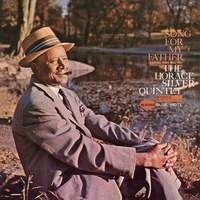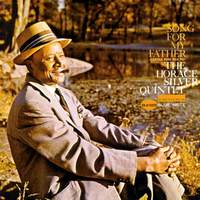Classic Recordings,
Horace Silver Quintet - Song for My Father
 A key figure in the formation of hard bop, Horace Silver was responsible for some of the most influential cuts in the style throughout the 1950s. A prolific artist throughout his life, Silver would continue recording and gigging until the early 2000s, after which he would retreat from the public eye due to health issues. Like many of the great figureheads in jazz history, many of the tunes from his vast songbook remain standards today, his playful approach to the piano encapsulated in his compositions. Silver’s life as a career musician began in 1950, when his trio played for Stan Getz; Silver’s recording debut would also be with Getz, playing in his quartet for an album that same year. Silver toured and recorded prolifically as a sideman throughout the early fifties, and was one of the founding members of the Jazz Messengers with Art Blakey - probably the player most associated with the Messengers - recording with them until 1956. In the years following, Silver led a quintet with an ever-changing lineup; even on Song for My Father we hear two different incarnations of the quintet. The impetus for this album, however, came from a trip to Brazil that Silver took in 1963. Silver’s father, pictured here on the artwork, is of Portuguese descent, and his trip to South America spurred on the pianist’s interest in his cultural heritage.
A key figure in the formation of hard bop, Horace Silver was responsible for some of the most influential cuts in the style throughout the 1950s. A prolific artist throughout his life, Silver would continue recording and gigging until the early 2000s, after which he would retreat from the public eye due to health issues. Like many of the great figureheads in jazz history, many of the tunes from his vast songbook remain standards today, his playful approach to the piano encapsulated in his compositions. Silver’s life as a career musician began in 1950, when his trio played for Stan Getz; Silver’s recording debut would also be with Getz, playing in his quartet for an album that same year. Silver toured and recorded prolifically as a sideman throughout the early fifties, and was one of the founding members of the Jazz Messengers with Art Blakey - probably the player most associated with the Messengers - recording with them until 1956. In the years following, Silver led a quintet with an ever-changing lineup; even on Song for My Father we hear two different incarnations of the quintet. The impetus for this album, however, came from a trip to Brazil that Silver took in 1963. Silver’s father, pictured here on the artwork, is of Portuguese descent, and his trip to South America spurred on the pianist’s interest in his cultural heritage.
The title track itself, easily Silver’s most well-known tune, is a tribute to this ancestry as its title suggests. Most notably the bossa-nova feel of the tune alludes to the Brazilian music of the decade, which would have been relatively new in the mid-60s, along with its bass ostinato driving the straight groove. The iconic trumpet lead melody is played by Carmell Jones, who replaced the long-standing Blue Mitchell as Silver’s trumpeter partway through the sessions for the album. As I mentioned before, Song for My Father captures the quintet in a transitional period; ‘Calcutta Cutie’ is the only tune on the album’s original tracklist to feature the prior lineup of Silver with Mitchell on trumpet, Junior Cook on tenor sax, Gene Taylor on bass and Roy Brooks on drums - although the slow closing ballad ‘Lonely Woman’ features Silver, Taylor and Brooks as a trio. The rest of the album features Silver’s new lineup, swapping out Mitchell for Jones on trumpet, with Joe Henderson filling in on tenor sax, Teddy Smith on bass and Roger Humphries on drums. With that being said, any expanded editions with bonus tracks (linked below) also feature the original lineup, with some featuring ‘Que Pasa?’ in the same trio format as ‘Lonely Woman’.
Songs for My Father is one of Blue Note’s most popular recordings of the hard bop era, and with Silver’s confident playing style that emphasises playful melodic leads, it’s one of the more catchy albums of the period. The whole of the album is comprised of Silver originals, with the exception of ‘The Kicker’ composed by Henderson, which also features a killer drum solo towards the latter half of the tune. Other standouts of the album include the fast-paced ‘The Natives Are Restless Tonight’, with more fiery lead playing from Jones, and an equally spirited solo from his sax counterpart Henderson. Song for My Father is undeniably a hard bop classic; while the title track itself blurs the lines between the American hard bop approach with the similarly new bossa-nova style of Brazil, without being overtly cross-cultural, the rest of the record doesn’t always hit the same bossa-nova flavour. But it most definitely grooves.
Available Formats: CD, MP3, FLAC, Hi-Res FLAC, Hi-Res+ FLAC
Available Formats: MP3, FLAC




